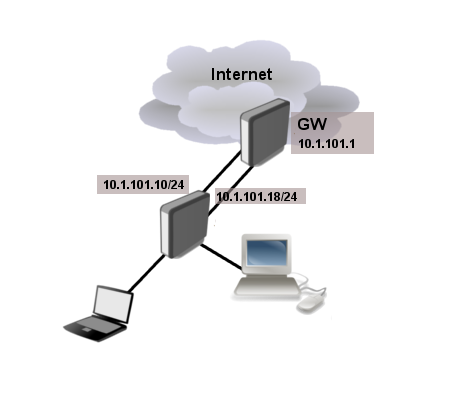Manual:Load balancing multiple same subnet links
Summary
This example demonstrates how to set up load balancing if provider is giving IP addresses from the same subnet for all links.
Application Example
Provider is giving us two links with IP addresses from the same network range (10.1.101.10/24 and 10.1.101.18/24). Gateway for both of these links is the same 10.1.101.1
Configuration
Here is the whole configuration for those who want to copy&paste
/ip address add address=10.1.101.18/24 interface=ether1 add address=10.1.101.10/24 interface=ether2 add address=192.168.1.1/24 interface=Local add address=192.168.2.1/24 interface=Local /ip route add gateway=10.1.101.1 add gateway=10.1.101.1%ether1 routing-mark=first add gateway=10.1.101.1%ether2 routing-mark=other /ip firewall nat add action=masquerade chain=srcnat out-interface=ether1 add action=masquerade chain=srcnat out-interface=ether2 /ip firewall mangle add action=mark-routing chain=prerouting src-address=192.168.1.0/24 new-routing-mark=first add action=mark-routing chain=prerouting src-address=192.168.2.0/24 new-routing-mark=other
IP address
In previous RadioOS version multiple IP addresses from the same subnet on different interfaces were not allowed. Fortunately v4 allows such configurations.
In this example our provider assigned two upstream links, one connected to ether1 and other to ether2. Our local network has two subnets 192.168.1.0/24 and 192.168.2.0/24
/ip address add address=10.1.101.18/24 interface=ether1 add address=10.1.101.10/24 interface=ether2 add address=192.168.1.1/24 interface=Local add address=192.168.2.1/24 interface=Local
After IP address is set up, connected route will be installed as ECMP route
[admin@CableFree] /ip route> print detail
0 ADC dst-address=10.1.101.0/24 pref-src=10.1.101.18 gateway=ether1,ether2
gateway-status=ether1 reachable,ether2 reachable distance=0 scope=10
Note: Routing filters can be used to adjust preferred source if needed
Mangle and NAT
In our example very simple policy routing is used. Clients from 192.168.1.0/24 subnet is marked to use "first" routing table and 192.168.2.0/24 to use "other" subnet.
/ip firewall mangle add action=mark-routing chain=prerouting src-address=192.168.1.0/24 new-routing-mark=first add action=mark-routing chain=prerouting src-address=192.168.2.0/24 new-routing-mark=other
And masquerade our local networks
/ip firewall nat add action=masquerade chain=srcnat out-interface=ether1 add action=masquerade chain=srcnat out-interface=ether2
Warning: You will also have to deal with traffic coming to and from the router itself. For explanations look at PCC configuration example.
IP route
We are adding two gateways, one to resolve in "first" routing table and another to "other" routing table.
/ip route add gateway=10.1.101.1%ether1 routing-mark=first add gateway=10.1.101.1%ether2 routing-mark=other
Interesting part of these routes is how we set gateway. gateway=10.1.101.1%ether1 means that gateway 10.1.101.1 will be explicitly reachable over ether1
[admin@CableFree] /ip route> print detail
Flags: X - disabled, A - active, D - dynamic,
C - connect, S - static, r - rip, b - bgp, o - ospf, m - mme,
B - blackhole, U - unreachable, P - prohibit
0 A S dst-address=0.0.0.0/0 gateway=10.1.101.1%ether2
gateway-status=10.1.101.1 reachable ether2 distance=1 scope=30
target-scope=10 routing-mark=other
1 A S dst-address=0.0.0.0/0 gateway=10.1.101.1%ether1
gateway-status=10.1.101.1 reachable ether1 distance=1 scope=30
target-scope=10 routing-mark=first
Finally, we have one additional entry specifying that traffic from the router itself (the traffic without any routing marks) will be resolved in main routing table.
/ip route add gateway=10.1.101.1
